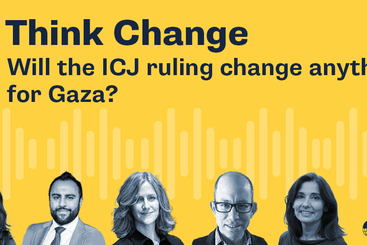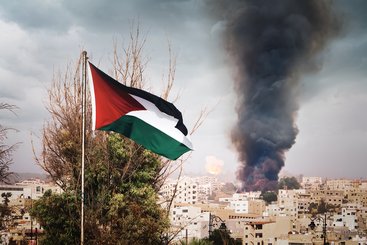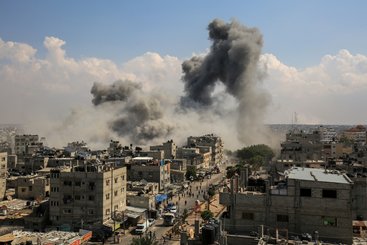Despite shifts in governance, vast sums of international aid and various peace talks, the Occupied Palestinian Territories cannot escape perpetual crisis due to Israel’s decades-long occupation.
Amidst the latest surge of violence in Gaza since 7 October, the world contends not only with a devastating civilian death toll but also a battle of narratives – with questions of how this violence is being framed, depicted and portrayed publicly, or the ‘stories’ that are shaping the public’s perception of the conflict.
The limits of neutrality
While much of the world has, quite rightly, focused on unpicking the narratives shaped by political figures and the media, as well as their consequences, much less attention has turned to narratives emanating from the humanitarian sector. Profound disagreements are rife between humanitarian leadership and staff, revealing concerns about the presence of ‘neutrality’ as staff highlight insufficient acknowledgement of longstanding Palestinian oppression and question the proximity of some United Nations agencies’ leadership to the United States government.
The repeated refusal of the United Kingdom and the US governments to call for a ceasefire has been mirrored by some international organisations, and many of those who did used underwhelming language when talking about Palestinian rights and Israeli accountability. The New Humanitarian reports on a disconnect between aid workers from the Global South, where most humanitarian activity is situated, and the sector’s disproportionately Western decision-makers, raising the question: is the humanitarian principle of neutrality increasingly at odds with decolonisation? By promoting an objective, non-partisan approach, neutrality inadvertently aligns with ‘saviourism’, implying that international aid actors are the only ones capable of fair and neutral arbitration. This notion reflects disturbing racist underpinnings, as it appears to privilege international actors above community members.
Ending the occupation
For many international organisations, neutrality is seen to improve access to affected populations in conflict. However, if aid agencies are willing to trade access for truth and justice, what is the genuine purpose of humanitarianism? Many aid professionals are urging humanitarian organisations to step out from behind the long-held tones of measured neutrality to instead be ‘more representative of the Global South’. According to one aid worker, ‘It did not start with the war on Gaza. Our organisations know better. It is a bit shocking to see that some organisations are even reluctant to say, “end of occupation.”’
Prior to the Oslo Accords, most aid to Palestinians was ‘emergency’ in nature. However, following the agreement, the focus shifted towards supporting the establishment of a two-state solution – a goal that remains unachieved 30 years later. This shift has overlooked a critical issue: humanitarian efforts have not effectively confronted the root cause of the need for aid, which is effectively Israel's occupation. Across the Occupied Palestinian Territories, UNRWA’s presence has enabled Israel to maintain its system of control, without having to assume full responsibility for the livelihoods, essential services and basic rights of the occupied population. In other words, by not directly challenging the root causes of Palestinian suffering, humanitarian aid has placed Palestinians on life support for the last 75 years.
The interplay between humanitarianism and decolonisation
The enduring challenges faced by the humanitarian sector are not without precedent. The ‘first wave’ of global NGO expansion in the 1950s and 1960s, a period marked by widespread decolonisation, saw humanitarian efforts aiming to fundamentally alter the course of the newly independent nations. This reciprocal influence between a decolonising world and the evolving field of humanitarianism set the stage for both its achievements and its limitations. But nowhere were the moral hazards of humanitarianism during twentieth-century decolonisation more apparent than in relation to the forced resettlement of civilians.
Forced resettlement, often undertaken in the guise of humanitarian intervention, laid bare the complex ethical dilemmas and unintended consequences that can arise when aid intersects with political agendas and colonial legacies. Today, over 80% of Gaza’s population has been internally displaced since October, and Israel’s military offensive has turned much of Gaza’s landscape into uninhabitable land as whole neighbourhoods and agricultural land have been erased. The Israeli government has not publicly confirmed any plan for Gaza’s population, but Israeli Intelligence Minister Gila Gamliel suggested in December that an ‘option’ would be ‘to promote the voluntary resettlement of Palestinians in Gaza, for humanitarian reasons, outside of the Strip’.
An active commitment to decolonisation
In confronting Israel’s settler-colonial military tactics, the humanitarian sector must stay true to its decolonisation commitments. The sector can learn from the ways in which humanitarian need was framed during the struggle against apartheid in South Africa. As the anti-apartheid movement developed into a global political discourse, it revealed how Black South Africans were not only victims of racial injustice, but of a system designed specifically for collective punishment. A humanitarian discourse against apartheid developed, highlighting it as a driver of crisis that must be dismantled. Global solidarity was paramount.
Decolonisation is not an academic pursuit. It is not a metaphor, nor is it a box-checking exercise. The humanitarian sector’s commitment to decolonisation is more critical now than ever – it is essential when entire families are wiped out, countless Palestinian children are orphaned and hundreds of thousands of people are on the precipice of famine. It is vital when Western media continues to peddle age-old racist and Orientalist tropes of ‘violent’ and ‘savage’ Arab men to justify Palestinian suffering. Decolonisation means the humanitarian sector must amplify Palestinian narratives, highlighting the ways in which Palestinians have endured decades-long occupation and oppression. Humanitarians’ influence must be leveraged for long-term justice for Palestinians. Anything less will perpetuate the sector’s role as an ineffectual bandage to a 75-year-old wound.





